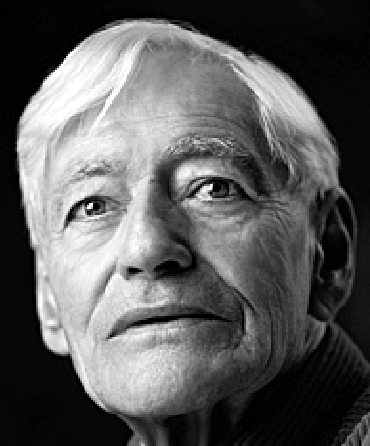The next Cascadia Poetry Festival happens May 1-3, 2020, on San Juan Island, at the Multiverse. The Life and Legacy of Robin Blaser and The Practice of Cascadia/The Practice of Self will be organizing themes. This fest will be a hybrid retreat/festival and will happen at The Multiverse on San Juan Island. Scheduled presenters are subject to change, but at this time include Mary Norbert Körte, Miriam Nichols, Sharon Thesen, Barry McKinnon and others TBA.
Tag: Sharon Thesen
News!
Reviews of CPF5, Tacoma 2017
by Splabman •
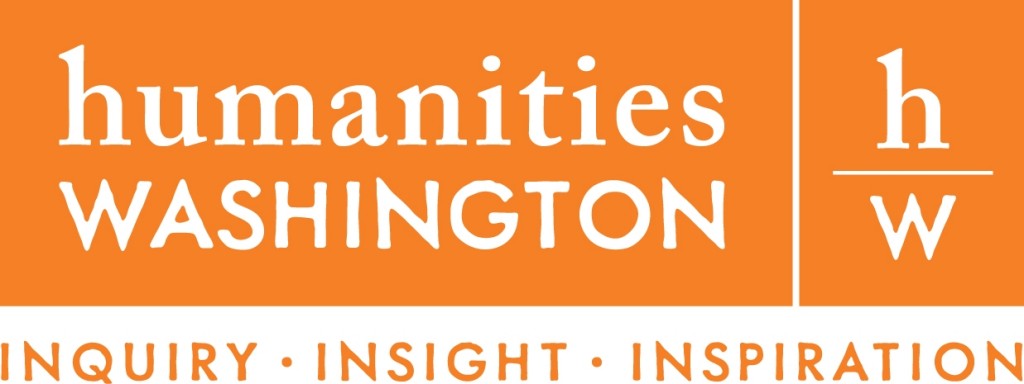
Humanities WA
Some reviews of CPF5 (Tacoma, WA, Oct 12-15, 2017) by some participants:
I’ve been to many poetry festivals over the years, and the Cascadia Festival is one of the best at combining literary energy with explorations of environmental, political, historical, and sociological pursuits with a general celebration of poetry. The invited poets offered a wonderful representation of the diversity of our bioregion—as did the poetics of the works shared. There were youth events, Veteran events, “living room readings” (that featured festival poets and anyone from the community could share work in). The WA historical piece embodied by the celebration of Richard Brautigan, the consistent return to thinking about poetry and the environment, the involvement of young poets, older poets: really, I cannot articulate how generous and egalitarian and stimulating the festival is. Truly, The Cascadia Poetry festival is a great thing for

Tod Marshall Photo by Amy Sinisterra
Humanities WA and Arts WA to be a sponsor of—to put it simply, The Festival repped well and did both organizations proud! I was glad to be there for it and am eager for the next one.
Tod Marshall
Washington Poet Laureate
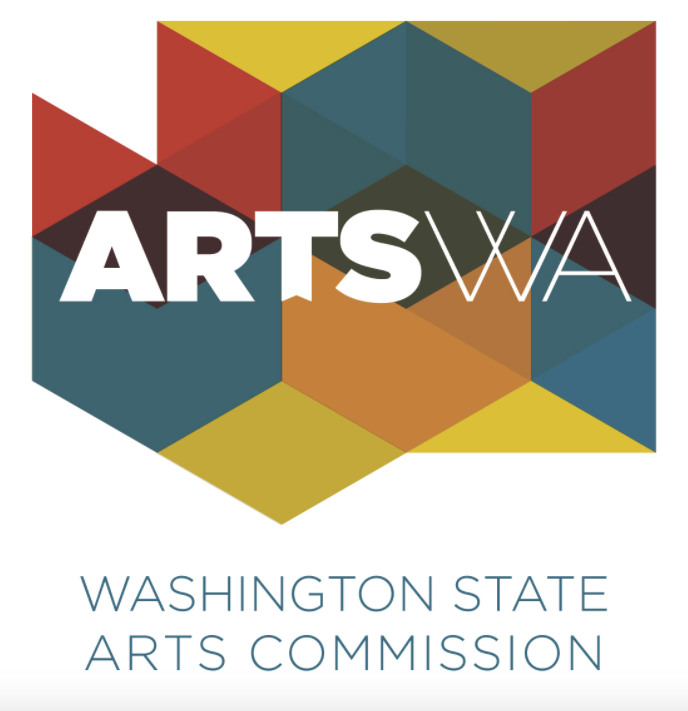
…It was a weekend’s concentration of poetry, poetics, disaster, disability, old age, young age, woundedness, healing, gathering, dispersing, and energy-producing. This was among the instabilities of the northwest coast Cascadian geography, and its history of conquest and adaptation. In fact, adaptation seemed to be an underlying theme–a positive theme–of the festival. Adaptation includes laughter, description, mourning, love, acknowledgement, and recognition. There was great poetry at this festival and it was brilliantly and respectfully organized. For myself, I also really appreciated being put up in a comfortable hotel room (with a view of Mt. Rainier) within walking distance of the venue, the venue itself (historical, dignified), and the courtesies and kindnesses extended by Paul and Dale and Bhakti and others working at the festival…
thanks, and talk soon,
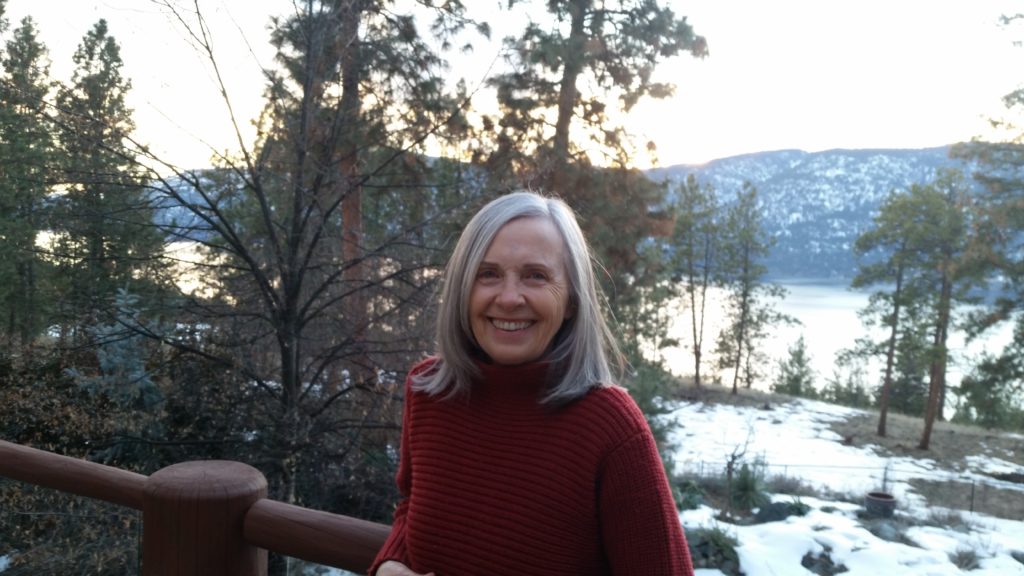 Sharon Thesen
Sharon Thesen
Kelowna, BC
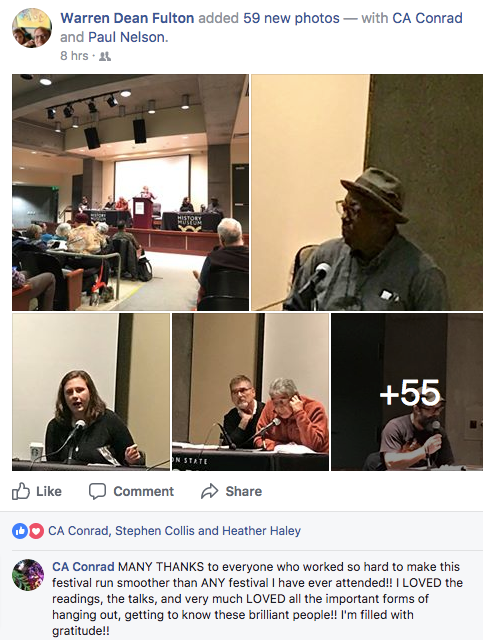
Paul,
Thank you again for organizing the Cascadia event (a much needed injection of creative energy & community in these bleak times) and especially for getting Michael McClure on the state history museum stage. That was a great setting for a poet of his stature.
Your (Persian Pony by Michael McClure) introduction is great, dude. It’s a marvelous distillation of the McClurean aesthetic & disposition. I’ve always admired your stunning clarity. One sentence in particular, “McClure’s poetic courage plumbs the depths of perception, achieves a precision of luminous details, a striking originality, and a range of expression form the cosmic to the microscopic,” is an excellent summation of McClure’s oceanic scope. Reading him always gives me a more acute sensation of being alive, having a physical presence especially, as well as a strong undercurrent transcendent force. Your intro encapsulates that quality with pith & mammalian warmth.
Painful to see Michael adjusting to what I assume is a recent hip replacement. Getting old sucks. But what a tour de force to get on stage and immediately begin reciting Chaucer from memory. Jesus, that’s amazing…
It was also really nice talking with Bhakti.
John Olson
Plans are being made for additional iterations of the festival. Please subscribe to this blog’s weekly emails to keep up to date on developments.
News!
Videos from CPF5, Tacoma 2017
by Splabman •
Thanks to Ra’anan David, video of the main events from the 5th Cascadia Poetry Festival, held October 12-15, 2017, in Tacoma, are now online:
7:30 Friday Main Stage: Readings featuring scheduled poets: Patricia Smith, Bruce Weigl, Lorna Dee Cervantes, Lucia Misch and Philip Red Eagle. MC – Jared Leising.
War Poetry/ Veterans Panel. MC – Abby Murray. Scheduled panelists, Philip Red Eagle, Bruce Weigl, Doug Johnson, Gary Copeland Lilley & Simone Gorrindo.
Tacoma’s Richard Brautigan: Life and Legacy Panel. MC – Nadine Antoinette Maestas. Scheduled panelists: Ianthe Brautigan, CAConrad, Tod Marshall and John Tanner.
Saturday Main Stage: Readings featuring scheduled poets: Ianthe Brautigan, C.A. Conrad, Sharon Thesen, Gary Lilley and Tod Marshall. MC – Thomas Walton.
Brautigan/Bernstein Plaque Unveiling:
Closing reading, Michael McClure, 5 days before he turned 85 years old.
News!
5TH CASCADIA POETRY FESTIVAL TO BE HELD OCTOBER 12-15 IN TACOMA
by Splabman •
FOR IMMEDIATE RELEASE
5TH CASCADIA POETRY FESTIVAL TO BE HELD OCTOBER 12-15 IN TACOMA
Public Readings, Workshops, Beat legend Michael McClure & tribute to Richard Brautigan
Seattle, WA, June 21, 2017—The Cascadia Poetry Festival is an international event which gathers writers, artists, scientists and activists to collaborate, discover and foster deeper connection between all inhabitants and the place itself. On October 12-15 2017, the 5th festival will take place in Tacoma, WA, at the Washington State History Museum and other venues. (This year marks the first year of a merger of the Cascadia Poetry Festival and the Tacoma Poetry Festival, the latter which was staged twice in Tacoma.)
Michael McClure, CAConrad, Ianthe Brautigan, Patricia Smith, Bruce Weigl, Washington Poet Laureate Tod Marshall, Sharon Thesen, Lucia Misch and Lorna Dee Cervantes are among the confirmed performers/participants. The festival will honor the memory of Richard Brautigan with a tribute on Saturday October 14, and a plaque dedication on Sunday October 15. There will also be a Tribute to Grunge, Friday, October 13, at 10pm, at the Harmon Barrel Room hosted by Hamish Todd. Full schedule at: www.cascadiapoetryfestival.org/2017-schedule/.
A $25.00 Gold Pass provides access to all festival events EXCEPT for workshops, which must be booked separately. (Although there are discounts on some workshops, and some are even free if you buy your gold pass early!) Due to overwhelming demand, workshops will ONLY be open to Gold Pass holders. Tickets can be purchased beginning July 12, 2017 via Brown Paper Tickets: http://cpf5.bpt.me
Admission to single events is $10 at the door.
As in prior incarnations of the festival, Living Room, a free, democratic reading for poets to read their original work in a circle format with other poets, will be held Friday, Saturday and Sunday from 3-5pm.
The launch of the anthology 56 Days of August: Poetry Postcards is Thursday, October 12, at King’s Books, 218 St Helens Ave Tacoma, WA, at 7pm and is free.
Saturday’s highlights include a War Poetry/Veterans Panel, Richard Brautigan Life & Legacy Panel. Sunday there are five workshops offered: Patricia Smith: Writing on the Other Side of the Wall, Tod Marshall: Finding Cascadia in Poetry, Laura Krughoff/Renee Simms: Tacoma Writers Resist, CAConrad: Karma Harvest A (Soma)tic Poetry Workshop, and Ianthe Brautigan: Memoir Workshop.
Each night of the festival features main stage readings by distinguished participants, and Michael McClure closes out the festival at 6pm Sunday. An award-winning American poet, playwright, songwriter, and novelist, he was one of the five poets who participated in the Six Gallery reading that featured the public debut of Allen Ginsberg’s landmark poem “Howl.” A key figure of the Beat Generation, McClure is immortalized as Pat McLear in Jack Kerouac’s novels The Dharma Bums and Big Sur.
The Cascadia Poetry Festival was founded by SPLAB, a Seattle-based non-profit organization founded in 1993. www.splab.org
###
For more information, contact Paul Nelson at 206-422-5002 or splabman@gmail.com.
News!
CPF5-Tacoma
by Splabman •

Lorna Dee Cervantes
The 5th Cascadia Poetry Festival will be in Tacoma, Washington, October 12-15, 2017 at the State History Museum, the Harmon Taproom and at least two other venues. All access Gold Passes are $25 and will be available via Brown Paper Tickets by July 12. Small Press Fair tables are $35 and can be reserved by sending $35 to pen (at) splab (dot) org via Paypal.

There will be a panel on War Poetry/Veterans and one on the legacy of Tacoma native Richard Brautigan, both on Saturday morning.
Living Room is a daily open reading for poets to read their own work in a circle format, 3-5pm, Friday, Saturday and Sunday.
Confirmed performers on the Main Stage include: CAConrad, Ianthe Brautigan, Bruce Weigl, WA Poet Laureate Tod Marshall, Sharon Thesen, Lorna Dee Cervantes and others to be announced.
There will be a Tribute to Grunge, Friday, October 13, at 10pm, at the Harmon Taproom hosted by Hamish Todd.

CAConrad
News!
Rewilding Poetry by Sharon Thesen
by Splabman •

“Rewilding Poetry” Panel
Cascadia Festival
Nanaimo, 2015
Sharon Thesen
By way of contributing to today’s discussion about the possibilities of “rewilding” (or, as I prefer to say, “re-worlding”) poetry, I would like to make a few observations to start with. One is a quotation from a book published in 1986 by Andrew Ross called The Failure of Modernism: “Poetics can no longer be regarded as the innocent haven for ‘wild’ philosophy or ‘wild’ politics which modernist poets claimed as their special privilege, but rather as a set of different and often conflicting discourses that are ideologically produced and therefore irreducible to any particular poet’s ‘vision’.” This describes pretty much the trajectory that poetry went on to take for the next three decades. Few poets now write without consciousness that discourse is ideologically produced and that they themselves inhabit, or are inhabited by, subject positions that are as distorted and unethical as the discourse they are situated in. Despite the fact that successions in poetry are part of its history of continuing renewal, and no poetic succession ever goes completely obsolete, what one poet calls “periodically recurring sweetness of heart” could be, I think, a welcome interregnum today. And perhaps a re-wilded, or re-worlded, poetry could find a place within contemporary poetics, affecting both poets and readers in a place where maybe it IS the “innocent haven for wild philosophy” that Ross accused deluded “modernist” poetry of being.
However, I feel cautious about the prefix “re,” implying an era of wild poetry either tamed and corralled, or displaced by domesticated monocultures, much as wild land has been; and that could, if elements of the wild ecology were re-introduced, revert to a wild condition. In practical terms, this might entail introducing the vernacular into a thickly abstracted lexicon; or vice versa; or using pictorial or scenic imagery to “disrupt” an appropriated text; or vice versa. These are techniques meant to mirror a dialectic. Larger versions of this dialectic (reformation, counter-reformation, restoration) have plagued modernity until neoliberalism vanquished them all and we are now thrown into a dark ages of ubiquitous empire. Except there are no uncolonized margins left. Everywhere is in the state of becoming a neoliberal monoculture, via technology, economic seduction, and/or brute force. As worldlessness consumes the earth, our attention is drawn to globalized cyberspace, if not to outer space—where, if we are lucky, we might run into the late Sun Ra, who said he was born on Saturn and whose musical composition “Space Is the Place” should be our global anthem.
By “the world” I mean the public world, the world we share in common. We are encouraged to think, however, that such commonality is a socially constructed fiction. We do not share a world, it seems to say, but rather there is a “we” that excludes others, a “we” to whom all wealth, power, and security are owed. The communities we belong to are communities of tastes and brands. As we cling more and more to our finely parsed identities, what we take to be the world is more and more a totality of fractalled and fracked surfaces. The ground opened by poetry, on the other hand—by the world-making activity of poeisis—restores us both to the world and to one another. The late Robin Blaser, who was very much concerned about the disappearance of the public world, as he thought along the lines suggested by Hannah Arendt’s work on totalitarianism, noted, “The public world has to do with the depths beneath the surfaces in which each simple, separate [and I would say “innocent” and “wild”] person swims—the rhythmic relationships by which one can notice that the surface is violent.” None of this has escaped the notice of poetry. Young poets today must write in such a vast and slippery territory, including the world-vaporizing currents of both neoliberalism and academic suspicion of imagination and spirituality (unless safely ensconsed within indigenous methodologies).
It seems to me that poetry’s de-wilding has been accelerated by top-down academic avant-gardism and its demand, similar to that of the corporations it now must service, for constant “innovation” (but with the caveat that the innovations also deploy “ethical” attitudes and activities, as its evangelical wing the Ted Talk also does). Avant-gardes used to be scandalous; now they are merely au courant. By re-branding former repressive rhetorical structures as “constraints” and by freely borrowing the discourses of other disciplines—usually cultural and critical theory—contemporary academic poets are redefining as wildnesses (that is, innovations) poetry’s traditional generic limitations and returning it to democratic speech. Here, the way to reclaim poetry’s life, to “rewild” it, is to pursue conceptualism. An urgently-required critique of dominant discourse (the discourse that also excludes earth and nature except as instrumentality) is in this way accomplished. But where I think the conceptual move has perhaps not quite delivered as far as rewilding poetry goes, is where it enacts a curation of discourse, the poem a proxy for the de-centred, voiceless, visionless subject. The poem is now without an unconscious, without depths, although its constituent words and referents are teeming with it.
This is not to dismiss the thought, passion, and knowledge driving a needed reaction to a poetry increasingly enervated by the plethora of “workshop verse” and conventional magazine verse. The blindnesses and complacencies of mainstream modernist lyric poetry have been decried for decades, and very recently Junot Diaz in a New Yorker article criticized the unbearable whiteness of creative writing programs. But there also exists a large contingent of informed and talented poets working on their own, although they will have aesthetic and personal alliances and claim a place in certain lineages. They are continuing to write the poetry that, as Gary Snyder put it, “lingers in the mind.” What San Francisco poet Duncan McNaughton referred to as “sweetness of heart” strikes me as a possibly interesting move toward a re-wilding that I believe is constantly trying to take place anyway. Sweetness of heart, McNaughton says, is “what is really common to our desirous souls, the quality which overcomes all barriers in order to circulate anew the heart’s creative feeling among men and women, who have more than enough reason to despair.” To radically expand the field of feeling seems an unintended ongoing work of any poetic practice of the wild.
I am interested in the nature of poetic imagination, or as Blake had it, poetic genius, which transcends the relative merits of anybody’s individual poem. Someone once said that even unpublished poetry has an effect on the world. I would say that poetic imagination is similarly alive in an infinite number of human feelings and interactions—with art, with nature, with each other, with spirituality, with language.
We have all seen representations of rewilded humanless cities, with vines hanging off the highrises and panthers draped over defunct signage, but this is not what we mean by the quest to rewild poetry. What is, or was, wild poetry? I suspect it would be poetry that speaks to us directly and openly, despite interiority of vision, or of distance or difference of time, space, and body, or formal peculiarity. There is presence, and with presence, unavoidable complexity of the poet’s sense of reality. Robert Duncan felt that poets were indeed on a “wild and far-out quest, albeit equipped with a pathetic compositional technology.” Yet, he says, no shrewdly imposed technology can work for long or at depth. Duncan felt that poetry was not interdisciplinary, that it couldn’t beg its ethics from other disciplines, and that the real audience for poetry, in the end, was human DNA. As a reader or a listener, I have often enough had a feeling of my life being made more vivid and real by hearing or reading a particular poem. I feel, quite literally, that I can go on. These are the poems that as Gary Snyder says “linger in the mind” and the body, and are part of the gift exchange that has turned out to be the ethos and spirit of this Cascadian event. This is the magic, the wildness, the innocence, the ecology of poetry, which is to say of poetic imagination. Poetry, the sound imagination makes in language, is always to our deepest communal benefit.
© SharonThesen, 2015


